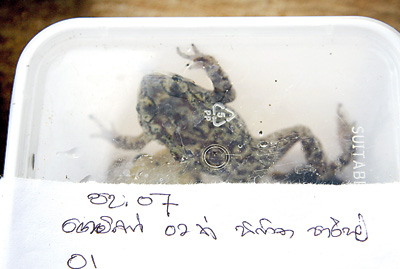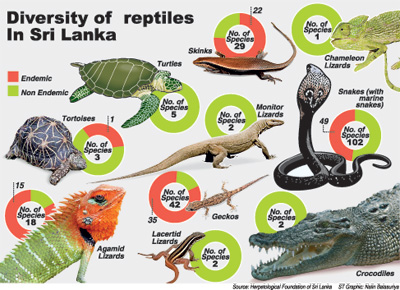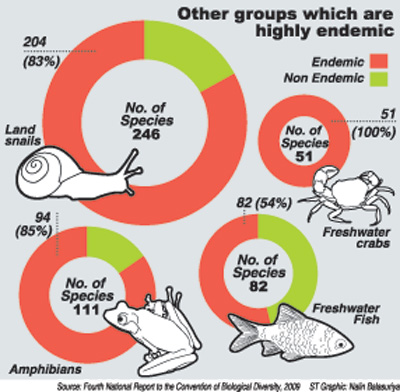Six overseas visitors have been arrested for the illegal possession of indigenous amphibians and reptiles. Acting on a tip-off, officers of the Department of Wildlife Conservation (DWC) made the arrests last Saturday after observing the visitors from the time they arrived in Sri Lanka early last month.
Wildlife officers kept close tabs on the group, whose itinery covered areas rich in amphibian and reptile wildlife, including the Sinharaja rainforest, Minneriya. Horton Plains, the Knuckles Group, and other parts of the hill country.

The foreigners being led out of the hotel. Pix by Hiran Priyankara Jayasinghe

One of the amphibians that was in the posession of the tourists
On February 25, the last day of the group’s visit, a team of wildlife officers, led by DWC Deputy Director of Law Enforcement, Ranjan Marasinghe, raided a hotel in Kalpitiya, on the west coast, where the visitors were staying.
The officers found four animals belonging to three amphibian species and a common garden lizard, as well as indigenous plants. The visitors also had in their possession test tubes, one containing the faeces of a star tortoise. The wildlife officers believe the group had come with intent to collect DNA samples and smuggle animals out of the country.
The visitors’ cameras were found to contain photographs of horned lizards, a lizard species unique to Horton Plains and the Knuckles Range. The group’s wildlife expedition was organised by Exo-Terra, a Europe-based company that specialises in amphibians and reptiles, and sells terrariums and a range of products relating to amphibian and reptile husbandry.
Every year, Exo-Terra organises a tour to a selected country, and this year Sri Lanka was the chosen destination. The tour was named “Sinharaja Expedition”, suggesting that the main focus of the visit was the Sinharaja rainforest.
According to the company’s website, www.exo-terra.com, the purpose of this year’s expedition was to conduct research on the herpetofauna of a unique part of Southern Asia.
The website claims that “three new species of reptiles” were found on a previous expedition. Exo-Terra also claims it found a new chameleon species in Southern Tanzania, and named it Van Heygen's Chameleon (Kinyongia vanheygeni), after Exo-Terra manager Emmanuel Van Heygen.
An e-mail sent out by Emmanuel Van Heygen claims the visitors to Sri Lanka had meant no harm and had been wrongly accused of having protected animals and “DNA samples” in their possession.
Keeping protected animals without a permit is an offence under the Fauna and Flora Ordinance of Sri Lanka.
Sri Lanka is a global hotspot for reptiles and amphibians with a high endemism. Over 85 per cent of 111 amphibians and over 50 per cent of the terrestrial reptiles found in Sri Lanka are endemic.


Vets and animal specialists in smuggling team
By Hiran Priyankara Jayasinghe in Puttalam
Sri Lanka’s rich bio-diversity attracts well-meaning overseas visitors and others whose motives are dubious. The arrest last week of six tourists engaged in smuggling animal and plant specimens out of the country has raised concerns among the authorities.
The foreigners had visited Sinharajah, Sigiriya, Wilpattu and Horton Plains in search of animal and plant species, according to the Wild Life Department Deputy Director, Ranjan Marasinghe,
The six suspects came from Belgium, Venezuela, Australia, and Germany. They included two veterinary surgeons, two zoo supervisors, a photographer, and one other.
The team arrived in Sri Lanka from India on February 9. Their visit was arranged by a local company operating from Borella. The company supplied a guide to accompany the team on their tour of the country.
Among the tourists’ equipment seized by Wildlife Department officers were gadgets to catch reptiles, including snakes. Poison extracted from the reptiles had been preserved in silicone gel. Officials say a milligram of the poison fetches up to Rs 2.5 million. Also found in the visitors’ possession were animal species unique to the Sinharajah and Dumbara nature reserves. It is believed that the smuggling has been going on for a while.
The suspects pleaded guilty when produced before the Puttalam Magistrate on February 29. They pleaded that they were not aware of local wild life regulations. They were released after paying fines of between Rs.30, 000 and Rs. 50, 000.
http://www.sundaytimes.lk/120304/News/nws_44.html
No comments:
Post a Comment